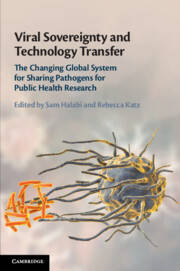 Viral Sovereignty and Technology Transfer
Viral Sovereignty and Technology Transfer Book contents
- Viral Sovereignty and Technology Transfer
- Viral Sovereignty and Technology Transfer
- Copyright page
- Contents
- Maps
- Tables
- Contributors
- Preface
- Acknowledgments
- Introduction Viral Sovereignty, Technology Transfer, and the Changing Global System for Sharing Pathogens for Public Health Research
- Part I The Geopolitical, Historical, and Scientific Context
- Part II Health Security, Research Ethics, and Human Rights Implications
- 4 The Ethics of Conducting Genomic Research in Low-Resource Settings
- 5 The Ethics of Human Pathogen Research during Public Health Emergencies in Low- and Middle-Income Countries
- 6 Biosecurity, Biosafety, and the Management of Dangerous Pathogens for Public Health Research
- 7 Human Rights Implications of Pathogen Sharing and Technology Transfer
- Part III Solutions: Standard Material Transfer Agreements, Repositories, and Specialized International Instruments
- Index
7 - Human Rights Implications of Pathogen Sharing and Technology Transfer
from Part II - Health Security, Research Ethics, and Human Rights Implications
Published online by Cambridge University Press: 15 May 2020
- Viral Sovereignty and Technology Transfer
- Viral Sovereignty and Technology Transfer
- Copyright page
- Contents
- Maps
- Tables
- Contributors
- Preface
- Acknowledgments
- Introduction Viral Sovereignty, Technology Transfer, and the Changing Global System for Sharing Pathogens for Public Health Research
- Part I The Geopolitical, Historical, and Scientific Context
- Part II Health Security, Research Ethics, and Human Rights Implications
- 4 The Ethics of Conducting Genomic Research in Low-Resource Settings
- 5 The Ethics of Human Pathogen Research during Public Health Emergencies in Low- and Middle-Income Countries
- 6 Biosecurity, Biosafety, and the Management of Dangerous Pathogens for Public Health Research
- 7 Human Rights Implications of Pathogen Sharing and Technology Transfer
- Part III Solutions: Standard Material Transfer Agreements, Repositories, and Specialized International Instruments
- Index
Summary
Chapter 7 analyzes the human right to the highest attainable standard of health, as the World Health Organization Constitution articulates it, as requiring both that scientific sharing for biomedical advances take place but also that the benefits of research must be distributed so as to ensure that humans have access to essential medicines. The right to science also seeks to ensure access to the benefits that arise from scientific research and its applications. These discussions are contextualized within the broader colonial histories of both global health and international law and recommends contextualizing both access to pathogens and the sharing of benefits within human rights obligations of states in a manner that is cohesive, and non-fragmented, with other international agreements, including the International Health Regulations and the Nagoya Protocol.
Keywords
- Type
- Chapter
- Information
- Viral Sovereignty and Technology TransferThe Changing Global System for Sharing Pathogens for Public Health Research, pp. 120 - 134Publisher: Cambridge University PressPrint publication year: 2020
